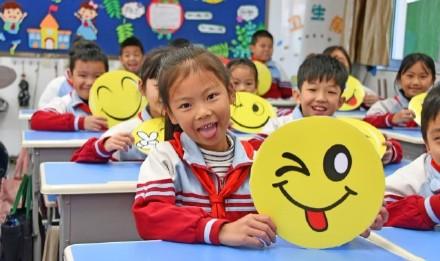There is no "artifact" to rely on in encouraging education.
"You are a clever boy, and I believe you can solve this problem." "Your efforts and persistence are very commendable" … Recently, the "child-praising artifact" similar to the "100-sentence kuawa template" became popular on the Internet.
Many parents "encourage" their children according to the template, thinking that they have got the "truth" of education, and many parents are worried. So, what is the really effective encouragement education for children?
Parents put down their sticks, abandoned their roars and embarked on the road of "non-violence" family education, believing that "good children are boastful" is worthy of recognition and promotion. But encouragement is not just "praising children", we should really make good use of encouraging education and avoid going to the other extreme. This is obviously not a problem that can be solved by a template, and we must not be superstitious and rely on "artifacts."
The theoretical sources of encouraging education are rich, such as expectation theory, behaviorism teaching theory and achievement motivation theory. Attribution theory in social psychology is an important theoretical source of stimulating education.
The encouragement of parents or teachers is actually to guide children and students to attribute their actions or results positively, to form a positive hint for children, and to guide children to work hard in the right direction in their future study and life. It should be pointed out that "encouraging education" or "encouraging education" is not always expressed by "praise". There is not only positive encouragement, but also timely criticism and guidance. Criticism is also a kind of encouragement. Therefore, encouraging education is not equal to "praising education", and its connotation and extension are not covered by "praising children’s artifacts".
What needs to be more vigilant is that simple "praise education" is prone to such negative effects: children’s pride, excessive emphasis on the positive evaluation of others, self-doubt after encountering difficulties, and serious collapse of confidence may occur.
In a word, "praise education" is only one of the methods of encouraging education, and we need to master the correct methods to avoid negative effects.
First, let children get the feeling of love. Sincere and loving language is the most powerful. If parents’ words and deeds can make children feel love, they will certainly give them the greatest encouragement and feel happiness and joy. The stylized language may be useful for young children, but for older children, the perfunctory feeling and "plastic texture" come to the fore, and the effect can be imagined.
Second, the key is to truly discover the bright spot of children. The core of encouraging education is that parents should find the bright spot of their children, instead of trying to organize language and "please" their children with praise. In order to change from "yelling at mom and dad" to "praising mom and dad", parents must first change the perspective of observing their children and truly discover and appreciate their excellent side. If you don’t really feel that your child is doing well, "hard praise" may embarrass both sides. And if we really find a bright spot recognized by both sides, then this bright spot will become brighter and brighter.
Third, the orientation should be clear and the direction should be specific. Clear orientation means that encouragement for children should be designed, for example, from personal efforts rather than from uncontrollable factors such as appearance. Pointing to the concrete means that the encouraged matters must point to the concrete actual behavior, not the virtual or expected matters.
Fourth, trust and pass the trust signal to the children. In encouraging education, the signal of trust to children plays a very important role. Trust is not a slogan, but should be practiced by parents. On the one hand, some parents trust their children, on the other hand, they do many things that make them lack trust, which makes them lose trust in their parents, and encouraging education is not easy to use.
In a word, encouraging education is a good method in parenting education, but it is by no means equal to "praising education". To make encouraging education effective, parents’ love, patience and carefulness are indispensable, especially the change of children’s observation perspective and evaluation perspective. (The author is the librarian of Xichang National Preschool Teachers College) Author: Liao Dekai

Source: China Education News Network